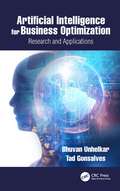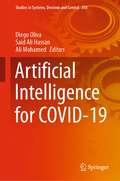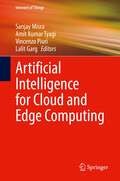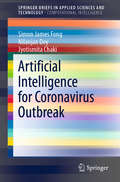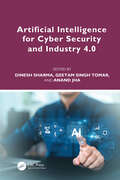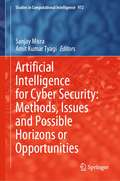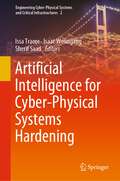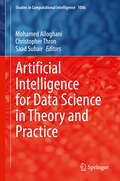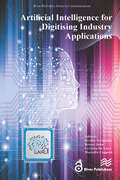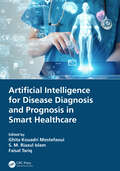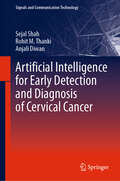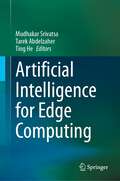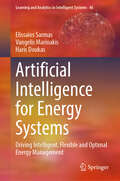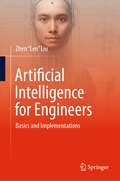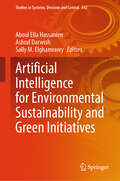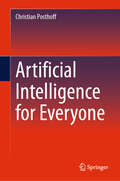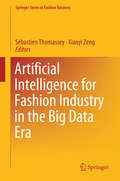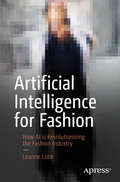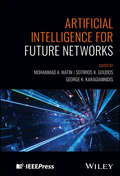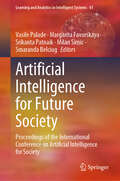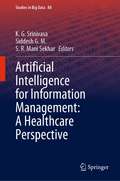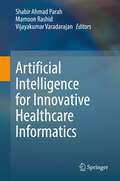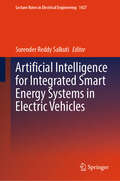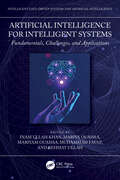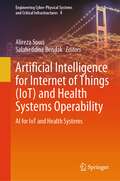- Table View
- List View
Artificial Intelligence for Business Optimization: Research and Applications
by Bhuvan Unhelkar Tad GonsalvesThis is primarily a business book that discusses the research and associated practical application of artificial intelligence (AI) and machine learning (ML) in order to achieve business optimization (BO). AI comprises a wide range of technologies, databases, algorithms, and devices. This book aims for a holistic approach to AI by focusing on developing business strategies that will not only automate but also optimize business functions, processes, and people’s behaviors. Artificial Intelligence for Business Optimization: Research and Applications explores AI and ML from a business viewpoint with the key purpose of enhancing customer value. It applies research methods and fundamentals from a practitioner’s viewpoint and incorporates discussions around risks and changes associated with the utilization of AI in business. Furthermore, governance risks, privacy, and security are also addressed in this book to ensure compliance with AI/ML applications. Readers should find direct and practical applications of the discussions in this book quite useful in their work environment. Researchers will find many ideas to further explore the applications of AI to business.
Artificial Intelligence for COVID-19 (Studies in Systems, Decision and Control #358)
by Diego Oliva Said Ali Hassan Ali MohamedThis book presents a compilation of the most recent implementation of artificial intelligence methods for solving different problems generated by the COVID-19. The problems addressed came from different fields and not only from medicine. The information contained in the book explores different areas of machine and deep learning, advanced image processing, computational intelligence, IoT, robotics and automation, optimization, mathematical modeling, neural networks, information technology, big data, data processing, data mining, and likewise. Moreover, the chapters include the theory and methodologies used to provide an overview of applying these tools to the useful contribution to help to face the emerging disaster. The book is primarily intended for researchers, decision makers, practitioners, and readers interested in these subject matters. The book is useful also as rich case studies and project proposals for postgraduate courses in those specializations.
Artificial Intelligence for Cloud and Edge Computing (Internet of Things)
by Vincenzo Piuri Sanjay Misra Lalit Garg Amit Kumar TyagiThis book discusses the future possibilities of AI with cloud computing and edge computing. The main goal of this book is to conduct analyses, implementation and discussion of many tools (of artificial intelligence, machine learning and deep learning and cloud computing, fog computing, and edge computing including concepts of cyber security) for understanding integration of these technologies. With this book, readers can quickly get an overview of these emerging topics and get many ideas of the future of AI with cloud, edge, and in many other areas. Topics include machine and deep learning techniques for Internet of Things based cloud systems; security, privacy and trust issues in AI based cloud and IoT based cloud systems; AI for smart data storage in cloud-based IoT; blockchain based solutions for AI based cloud and IoT based cloud systems.This book is relevent to researchers, academics, students, and professionals.
Artificial Intelligence for Coronavirus Outbreak (SpringerBriefs in Applied Sciences and Technology)
by Nilanjan Dey Jyotismita Chaki Simon James FongThis book examines how the wonders of AI have contributed to the battle against COVID-19. Just as history repeats itself, so do epidemics and pandemics. In the face of the novel coronavirus disease, COVID-19, the book explores whether, in this digital era where artificial intelligence is successfully applied in all areas of industry, we are doing any better than our ancestors did in dealing with pandemics. One of the most contagious diseases ever known, COVID-19 is spreading like wildfire around and has cost thousands of human lives.The book discusses how AI can help fight this deadly virus, from early warnings, prompt emergency responses, and critical decision-making to surveillance drones. Serving as a technical reference resource, data analytic tutorial and a chronicle of the application of AI in epidemics, this book will appeal to academics, students, data scientists, medical practitioners, and anybody who is concerned about this global epidemic.
Artificial Intelligence for Cyber Security and Industry 4.0
by Dinesh Sharma Geetam Singh Tomar Anand JhaArtificial Intelligence for Cyber Security and Industry 4.0 offers a comprehensive exploration of the intersection of artificial intelligence (AI) and cyber security, providing readers with a thorough understanding of both the advantages and risks posed by AI technologies in modern industries. Covering a wide array of topics, from data anonymization and intrusion detection to AI's role in cloud security, border surveillance, and healthcare, this book addresses current challenges and proposes innovative solutions. It also highlights ethical concerns related to AI's use in weapon autonomy and border migration. This book is ideal for researchers, industry professionals, policy makers, and students looking to deepen their knowledge of AI's impact on cyber security and its applications in the evolving landscape of Industry 4.0. Through practical insights and forward-thinking discussions, readers will gain a well-rounded perspective on how AI can be leveraged for security while being mindful of emerging risks.Key Features: Explores the dual role of AI in strengthening and threatening cyber security in the context of Industry 4.0 Provides an in-depth analysis of AI-driven cyber security techniques, including machine learning-based intrusion detection and data anonymization Investigates the malicious use of AI, addressing both expanded existing threats and the emergence of novel vulnerabilities Discusses advanced software design for privacy preservation in big data environments Covers the use of AI in specific security domains, such as border surveillance, healthcare, and the Internet of Things Highlights AI applications in cloud security, data integrity, and privacy protection Introduces Quantum Machine Learning algorithms and their relevance to cyber security Explores the ethical concerns surrounding AI technologies, particularly in the context of weapon autonomy and border migration Includes real-world scenarios and methodologies, bridging the gap between academic research and industry practice Offers forward-looking insights into the role of AI in future cyber security challenges and solutions
Artificial Intelligence for Cyber Security: Methods, Issues and Possible Horizons or Opportunities (Studies in Computational Intelligence #972)
by Sanjay Misra Amit Kumar TyagiThis book provides stepwise discussion, exhaustive literature review, detailed analysis and discussion, rigorous experimentation results (using several analytics tools), and an application-oriented approach that can be demonstrated with respect to data analytics using artificial intelligence to make systems stronger (i.e., impossible to breach). We can see many serious cyber breaches on Government databases or public profiles at online social networking in the recent decade. Today artificial intelligence or machine learning is redefining every aspect of cyber security. From improving organizations’ ability to anticipate and thwart breaches, protecting the proliferating number of threat surfaces with Zero Trust Security frameworks to making passwords obsolete, AI and machine learning are essential to securing the perimeters of any business. The book is useful for researchers, academics, industry players, data engineers, data scientists, governmental organizations, and non-governmental organizations.
Artificial Intelligence for Cyber-Physical Systems Hardening (Engineering Cyber-Physical Systems and Critical Infrastructures #2)
by Isaac Woungang Issa Traore Sherif SaadThis book presents advances in security assurance for cyber-physical systems (CPS) and report on new machine learning (ML) and artificial intelligence (AI) approaches and technologies developed by the research community and the industry to address the challenges faced by this emerging field. Cyber-physical systems bridge the divide between cyber and physical-mechanical systems by combining seamlessly software systems, sensors, and actuators connected over computer networks. Through these sensors, data about the physical world can be captured and used for smart autonomous decision-making. This book introduces fundamental AI/ML principles and concepts applied in developing secure and trustworthy CPS, disseminates recent research and development efforts in this fascinating area, and presents relevant case studies, examples, and datasets. We believe that it is a valuable reference for students, instructors, researchers, industry practitioners, and related government agencies staff.
Artificial Intelligence for Data Science in Theory and Practice (Studies in Computational Intelligence #1006)
by Saad Subair Christopher Thron Mohamed AlloghaniThis book provides valuable information on effective, state-of-the-art techniques and approaches for governments, students, researchers, practitioners, entrepreneurs and teachers in the field of artificial intelligence (AI). The book explains the data and AI, types and properties of data, the relation between AI algorithms and data, what makes data AI ready, steps of data pre-processing, data quality, data storage and data platforms. Therefore, this book will be interested by AI practitioners, academics, researchers, and lecturers in computer science, artificial intelligence, machine learning and data sciences.
Artificial Intelligence for Digitising Industry – Applications
by Marcello Coppola Cristina De Luca Ovidiu Vermesan Reiner JohnThis book provides in-depth insights into use cases implementing artificial intelligence (AI) applications at the edge. It covers new ideas, concepts, research, and innovation to enable the development and deployment of AI, the industrial internet of things (IIoT), edge computing, and digital twin technologies in industrial environments. The work is based on the research results and activities of the AI4DI project, including an overview of industrial use cases, research, technological innovation, validation, and deployment. This book’s sections build on the research, development, and innovative ideas elaborated for applications in five industries: automotive, semiconductor, industrial machinery, food and beverage, and transportation. The articles included under each of these five industrial sectors discuss AI-based methods, techniques, models, algorithms, and supporting technologies, such as IIoT, edge computing, digital twins, collaborative robots, silicon-born AI circuit concepts, neuromorphic architectures, and augmented intelligence, that are anticipating the development of Industry 5.0. Automotive applications cover use cases addressing AI-based solutions for inbound logistics and assembly process optimisation, autonomous reconfigurable battery systems, virtual AI training platforms for robot learning, autonomous mobile robotic agents, and predictive maintenance for machines on the level of a digital twin. AI-based technologies and applications in the semiconductor manufacturing industry address use cases related to AI-based failure modes and effects analysis assistants, neural networks for predicting critical 3D dimensions in MEMS inertial sensors, machine vision systems developed in the wafer inspection production line, semiconductor wafer fault classifications, automatic inspection of scanning electron microscope cross-section images for technology verification, anomaly detection on wire bond process trace data, and optical inspection. The use cases presented for machinery and industrial equipment industry applications cover topics related to wood machinery, with the perception of the surrounding environment and intelligent robot applications. AI, IIoT, and robotics solutions are highlighted for the food and beverage industry, presenting use cases addressing novel AI-based environmental monitoring; autonomous environment-aware, quality control systems for Champagne production; and production process optimisation and predictive maintenance for soybeans manufacturing. For the transportation sector, the use cases presented cover the mobility-as-a-service development of AI-based fleet management for supporting multimodal transport. This book highlights the significant technological challenges that AI application developments in industrial sectors are facing, presenting several research challenges and open issues that should guide future development for evolution towards an environment-friendly Industry 5.0. The challenges presented for AI-based applications in industrial environments include issues related to complexity, multidisciplinary and heterogeneity, convergence of AI with other technologies, energy consumption and efficiency, knowledge acquisition, reasoning with limited data, fusion of heterogeneous data, availability of reliable data sets, verification, validation, and testing for decision-making processes.
Artificial Intelligence for Disease Diagnosis and Prognosis in Smart Healthcare
by Faisal Tariq Ghita Kouadri Mostefaoui Islam, S. M. RiazulArtificial Intelligence (AI) in general and machine learning (ML) and deep learning (DL) in particular and related digital technologies are a couple of fledging paradigms that next-generation healthcare services are sprinting towards. These digital technologies can transform various aspects of healthcare, leveraging advances in computing and communication power. With a new spectrum of business opportunities, AI-powered healthcare services will improve the lives of patients, their families, and societies. However, the application of AI in the healthcare field requires special attention given the direct implication with human life and well-being. Rapid progress in AI leads to the possibility of exploiting healthcare data for designing practical tools for automated diagnosis of chronic diseases such as dementia and diabetes. This book highlights the current research trends in applying AI models in various disease diagnoses and prognoses to provide enhanced healthcare solutions. The primary audience of the book are postgraduate students and researchers in the broad domain of healthcare technologies. Features In-depth coverage of the role of AI in smart healthcare Research guidelines for AI and data science researchers/practitioners interested in the healthcare sector Comprehensive coverage on security and privacy issues for AI in smart healthcare
Artificial Intelligence for Early Detection and Diagnosis of Cervical Cancer (Signals and Communication Technology)
by Rohit M. Thanki Sejal Shah Anjali DiwanThis book introduces the revolutionary use of AI in the field of cervical cancer detection. The book explores how advanced computer algorithms can analyze medical images and patient data to enhance early detection and accurate diagnosis of cervical cancer. The book starts by providing a comprehensive overview of cervical cancer, its risk factors, and the importance of early detection. It then delves into the fundamental concepts of artificial intelligence and its application in healthcare. Readers will gain a deeper understanding of how AI algorithms can "see" patterns in cervical cells and tissue, enabling the detection of abnormal cells and precancerous changes that may indicate the presence of cervical cancer. Drawing on the latest research and real-world case studies, the book showcases the various AI techniques used for cervical cancer screening, including the analysis of Pap smear and liquid-based cytology images. This book is an essential read for healthcare professionals, researchers, policymakers, and anyone interested in the intersection of AI and healthcare.
Artificial Intelligence for Edge Computing
by Mudhakar Srivatsa Tarek Abdelzaher Ting HeIt is undeniable that the recent revival of artificial intelligence (AI) has significantly changed the landscape of science in many application domains, ranging from health to defense and from conversational interfaces to autonomous cars. With terms such as “Google Home”, “Alexa”, and “ChatGPT” becoming household names, the pervasive societal impact of AI is clear. Advances in AI promise a revolution in our interaction with the physical world, a domain where computational intelligence has always been envisioned as a transformative force toward a better tomorrow. Depending on the application family, this domain is often referred to as Ubiquitous Computing, Cyber-Physical Computing, or the Internet of Things. The underlying vision is driven by the proliferation of cheap embedded computing hardware that can be integrated easily into myriads of everyday devices from consumer electronics, such as personal wearables and smart household appliances, to city infrastructure and industrial process control systems. One common trait across these applications is that the data that the application operates on come directly (typically via sensors) from the physical world. Thus, from the perspective of communication network infrastructure, the data originate at the network edge. From a performance standpoint, there is an argument to be made that such data should be processed at the point of collection. Hence, a need arises for Edge AI -- a genre of AI where the inference, and sometimes even the training, are performed at the point of need, meaning at the edge where the data originate. The book is broken down into three parts: core problems, distributed problems, and other cross-cutting issues. It explores the challenges arising in Edge AI contexts. Some of these challenges (such as neural network model reduction to fit resource-constrained hardware) are unique to the edge environment. They need a novel category of solutions that do not parallel more typical concerns in mainstream AI. Others are adaptations of mainstream AI challenges to the edge space. An example is overcoming the cost of data labeling. The labeling problem is pervasive, but its solution in the IoT application context is different from other contexts. This book is not a survey of the state of the art. With thousands of publications appearing in AI every year, such a survey is doomed to be incomplete on arrival. It is also not a comprehensive coverage of all the problems in the space of Edge AI. Different applications pose different challenges, and a more comprehensive coverage should be more application specific. Instead, this book covers some of the more endemic challenges across the range of IoT/CPS applications. To offer coverage in some depth, we opt to cover mainly one or a few representative solutions for each of these endemic challenges in sufficient detail, rather that broadly touching on all relevant prior work. The underlying philosophy is one of illustrating by example. The solutions are curated to offer insight into a way of thinking that characterizes Edge AI research and distinguishes its solutions from their more mainstream counterparts.
Artificial Intelligence for Energy Systems: Driving Intelligent, Flexible and Optimal Energy Management (Learning and Analytics in Intelligent Systems #46)
by Haris Doukas Elissaios Sarmas Vangelis MarinakisThis book focuses on creating an integrated library of learning models and optimization techniques to assist decision-making on issues in the energy and building sector. It provides modern solutions to energy management and efficiency while addressing a scientific gap in the development of advanced algorithmic methods to solve these problems. More specifically, the focus is on the development of models and algorithms for problems falling into three broader categories, namely: (a) Distributed Energy Generation, (b) Microgrid Flexibility, and (c) Building Energy Efficiency. Artificial Intelligence models and mathematical optimization techniques are developed and presented for applications related to each of these categories, through a thorough analysis of the fundamental parameters of each application as well as the interactions among them. Professors, researchers, scientists, engineers, and students in energy sector-related disciplines are expected to be inspired and benefit from this book, along with readers from other disciplines wishing to learn more about this exciting new field of research.
Artificial Intelligence for Engineers: Basics and Implementations
by Zhen "Leo" LiuThis textbook presents basic knowledge and essential toolsets needed for people who want to step into artificial intelligence (AI). The book is especially suitable for those college students, graduate students, instructors, and IT hobbyists who have an engineering mindset. That is, it serves the idea of getting the job done quickly and neatly with an adequate understanding of why and how. It is designed to allow one to obtain a big picture for both AI and essential AI topics within the shortest amount of time.
Artificial Intelligence for Environmental Sustainability and Green Initiatives (Studies in Systems, Decision and Control #542)
by Ashraf Darwish Aboul Ella Hassanien Sally M. ElghamrawyThis book discusses AI's applications in sustainability, exploring its potential in sectors such as energy, healthcare, agriculture, transportation, and waste management. Discusses applications and innovations in Green Initiatives such as energy, finance, and drug discovery. Highlights the ethical challenges and benefits of integrating AI into sustainability initiatives
Artificial Intelligence for Everyone
by Christian PosthoffThis book demystifies the topic of Artificial Intelligence for readers of varying backgrounds. The content should enable many people to discuss and follow ongoing developments in an informed way, to draw conclusions for their own life and workplace and to acquire the necessary new knowledge. The book strives to provide basic knowledge that will objectify the discussions and relieve some of the creepiness of utopian films. It must also be understood that research results are a necessary condition for progress; they are not sufficient until they can be translated into practice embedded in programs. This difficult relationship between theory and practice has been known for a long time.
Artificial Intelligence for Fashion Industry in the Big Data Era (Springer Series in Fashion Business)
by Sébastien Thomassey Xianyi ZengThis book provides an overview of current issues and challenges in the fashion industry and an update on data-driven artificial intelligence (AI) techniques and their potential implementation in response to those challenges. Each chapter starts off with an example of a data-driven AI technique on a particular sector of the fashion industry (design, manufacturing, supply or retailing), before moving on to illustrate its implementation in a real-world application
Artificial Intelligence for Fashion: How AI is Revolutionizing the Fashion Industry
by Leanne LuceLearn how Artificial Intelligence (AI) is being applied in the fashion industry. With an application focused approach, this book provides real-world examples, breaks down technical jargon for non-technical readers, and provides an educational resource for fashion professionals. The book investigates the ways in which AI is impacting every part of the fashion value chain starting with product discovery and working backwards to manufacturing. Artificial Intelligence for Fashion walks you through concepts, such as connected retail, data mining, and artificially intelligent robotics. Each chapter contains an example of how AI is being applied in the fashion industry illustrated by one major technological theme. There are no equations, algorithms, or code. The technological explanations are cumulative so you'll discover more information about the inner workings of artificial intelligence in practical stages as the book progresses. What You’ll LearnGain a basic understanding of AI and how it is used in fashionUnderstand key terminology and concepts in AIReview the new competitive landscape of the fashion industryConceptualize and develop new ways to apply AI within the workplaceWho This Book Is ForFashion industry professionals from designers, managers, department heads, and executives can use this book to learn about how AI is impacting roles in every department and profession.
Artificial Intelligence for Future Networks
by Mohammad A. Matin George K. Karagiannidis Sotirios K. GoudosAn exploration of connected intelligent edge, artificial intelligence, and machine learning for B5G/6G architecture Artificial Intelligence for Future Networks illuminates how artificial intelligence (AI) and machine learning (ML) influence the general architecture and improve the usability of future networks like B5G and 6G through increased system capacity, low latency, high reliability, greater spectrum efficiency, and support of massive internet of things (mIoT). The book reviews network design and management, offering an in-depth treatment of AI oriented future networks infrastructure. Providing up-to-date materials for AI empowered resource management and extensive discussion on energy-efficient communications, this book incorporates a thorough analysis of the recent advancement and potential applications of ML and AI in future networks. Each chapter is written by an expert at the forefront of AI and ML research, highlighting current design and engineering practices and emphasizing challenging issues related to future wireless applications. Some of the topics include: Signal processing and detection, covering preprocess and level signals, transform signals and extract features, and training and deploying AI models and systemsChannel estimation and prediction, covering channel characteristics, modeling, and classic learning-aided and AI-aided estimation techniquesResource allocation, covering resource allocation optimization and efficient power consumption for different computing paradigms such as Cloud, Edge, Fog, IoT, and MECAntenna design using AI, covering basics of antennas, EM simulator/optimization algorithms, and surrogate modeling Identifying technical roadblocks and sharing cutting-edge research on developing methodologies, Artificial Intelligence for Future Networks is an essential reference on the subject for professionals and researchers involved in the field of wireless communications and networks, along with graduate and PhD students in electrical and computer engineering programs of study.
Artificial Intelligence for Future Society: Proceedings of the International Conference on Artificial Intelligence for Society (Learning and Analytics in Intelligent Systems #41)
by Vasile Palade Srikanta Patnaik Margarita Favorskaya Smaranda Belciug Milan Simic"Artificial Intelligence for Future Society" presents the revolution in future societies by enhancing efficiency, connectivity, and personalization across various sectors. Its future aspects include the integration of AI in everyday life through smart cities, autonomous vehicles, and advanced healthcare systems, providing a more intelligent, responsive, and adaptive environment that meets the evolving needs of humanity. This volume explores the most recent innovations and significant developments in the domains of Artificial Intelligence and its impact in transforming society, propelling innovation across diverse fields such as healthcare, education, finance, and transportation. It spans a wide range of dimensions, including: Societal Diversity Innovation in the Digital Age Business Information Systems Advancement in Healthcare, HSI, and Global Collaboration By merging cutting-edge theoretical insights with practical applications, this volume provides researchers, practitioners, and students with the essential knowledge and tools to explore and advance within the dynamic field of Artificial Intelligence. Artificial Intelligence brings numerous benefits to society, including improved efficiency and productivity in various industries through automation and intelligent data analysis. It enhances healthcare with advanced diagnostic tools and personalized treatment plans, and provides smarter living environments through smart cities and innovative technologies.
Artificial Intelligence for Information Management: A Healthcare Perspective (Studies in Big Data #88)
by K. G. Srinivasa Siddesh G. M. S. R. Mani SekharThis book discusses the advancements in artificial intelligent techniques used in the well-being of human healthcare. It details the techniques used in collection, storage and analysis of data and their usage in different healthcare solutions. It also discusses the techniques of predictive analysis in early diagnosis of critical diseases. The edited book is divided into four parts – part A discusses introduction to artificial intelligence and machine learning in healthcare; part B highlights different analytical techniques used in healthcare; part C provides various security and privacy mechanisms used in healthcare; and finally, part D exemplifies different tools used in visualization and data analytics.
Artificial Intelligence for Innovative Healthcare Informatics
by Shabir Ahmad Parah Mamoon Rashid Vijayakumar VaradarajanThere are several popular books published in Healthcare Computational Informatics like Computational Bioengineering and Bioinformatics (2020), Springer; Health Informatics (2017), Springer; Health Informatics Vision: From Data via Information to Knowledge (2019), IOS Press; Data Analytics in Biomedical Engineering and Healthcare (2020), Elsevier. However, in all these mentioned books, the challenges in Biomedical Imaging are solved in one dimension by use of any specific technology like Image Processing, Machine Learning or Computer Aided Systems. In this book, the book it has been attempted to bring all technologies related to computational analytics together and apply them on Biomedical Imaging.
Artificial Intelligence for Integrated Smart Energy Systems in Electric Vehicles (Lecture Notes in Electrical Engineering #1427)
by Surender Reddy SalkutiThis book provides a comprehensive exploration of cutting-edge research in electric vehicles (EVs) integrated smart energy systems with a main focus on the application of artificial intelligence (AI). This book offers a wide and comprehensive practical approach with the applications of AI to address the challenges and opportunities of modern hybrid energy systems for developing advanced hybrid intelligent methodologies for forecasting and scheduling variable power output from renewable energy sources (RESs) and EVs. This will enhance system flexibility and facilitate the integration of RESs and EVs efficiently, which is a step towards a sustainable future. The chapters cover diverse topics offering valuable knowledge and methodologies including an introduction to Artificial Intelligence (AI), Machine Learning (ML), Internet of Things (IoT), Cybersecurity, and their applications in modern power and energy systems, intelligent control of power electronics for RESs and EVs, intelligent charging management of EVs, etc. This book aims to provide insights into various suitable solutions to increase the security, reliability, and interoperability of the grid under high penetration of renewable energy, storage systems, and electric transport in the context of the modern smart grid. The multi-objective optimization problems such as economic and emission dispatch problems; flexibility and reliability problems; and economic and reliability problems are solved to determine the trade-off solutions using efficient evolutionary algorithms. The chapters cover diverse topics offering valuable knowledge and methodologies including an introduction to Artificial Intelligence (AI), Machine Learning (ML), IoT, Cybersecurity, and their applications in modern power and energy systems, intelligent control of power electronics for RESs and EVs, intelligent charging management of EVs, etc.
Artificial Intelligence for Intelligent Systems: Fundamentals, Challenges, and Applications (Intelligent Data-Driven Systems and Artificial Intelligence)
by Mariya Ouaissa Mariyam Ouaissa Inam Ullah Khan Muhammad Fayaz Rehmat UllahThe aim of this book is to highlight the most promising lines of research, using new enabling technologies and methods based on AI/ML techniques to solve issues and challenges related to intelligent and computing systems. Intelligent computing easily collects data using smart technological applications like IoT-based wireless networks, digital healthcare, transportation, blockchain, 5.0 industry and deep learning for better decision making. AI enabled networks will be integrated in smart cities' concept for interconnectivity. Wireless networks will play an important role. The digital era of computational intelligence will change the dynamics and lifestyle of human beings. Future networks will be introduced with the help of AI technology to implement cognition in real-world applications. Cyber threats are dangerous to encode information from network. Therefore, AI-Intrusion detection systems need to be designed for identification of unwanted data traffic.This book: Provides a better understanding of artificial intelligence-based applications for future smart cities Presents a detailed understanding of artificial intelligence tools for intelligent technologies Showcases intelligent computing technologies in obtaining optimal solutions using artificial intelligence Discusses energy-efficient routing protocols using artificial intelligence for Flying ad-hoc networks (FANETs) Covers machine learning-based Intrusion detection system (IDS) for smart grid It is primarily written for senior undergraduate, graduate students, and academic researchers in the fields of electrical engineering, electronics and communication engineering, and computer engineering.
Artificial Intelligence for Internet of Things: AI for IoT and Health Systems (Engineering Cyber-Physical Systems and Critical Infrastructures #8)
by Alireza Souri Salaheddine BendakIoTHIC-2023 is a multidisciplinary, peer-reviewed international conference on Internet of Things (IoT) and healthcare systems with Artificial Intelligence (AI) techniques such as data mining, machine learning, image processing, and meta-heuristic algorithms. The AI-based techniques are applied on many fields of healthcare systems, including predicting and detecting diseases in hospitals, clinics, smart health monitoring systems, surgery, medical services, and etc.
